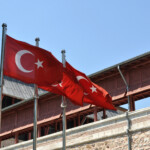Women have a lot to lose if the AKP remains in power. The party has taken a number of controversial stances against gender equality in recent years.
In a report that was published in 2007 by the European Stability Initiative, Turkey’s ruling Justice and Development Party (AKP) was hailed for bringing about reforms to empower women since coming to power in 2002.
“If this report had been written in 1999, the year Turkey gained the status of candidate for EU membership, its conclusions would have been deeply pessimistic. Writing in 2007, however, the perspective shifts dramatically,” wrote the authors of the report.
Citing amendments to the Turkish Constitution, a new civil code, reforms to the employment law, the establishment of family courts, and a reformed penal code, the authors argued these reforms brought “comprehensive changes to the legal status of women” and that these were “the most radical reforms since the abolition of polygamy in the 1920s.”
That 2007 report is drastically different from Turkey’s gender landscape in 2023. And in the lead-up to Turkey’s general election on May 14 and mounting political polarization, women have a lot to lose if the AKP remains in power.
The AKP has taken a number of controversial stances against gender equality in recent years. The ruling party has proposed limiting abortion rights, the morning-after pill, and cesarean sections. AKP leader President Erdoğan himself once suggested women can’t be equal to men, that women must be mothers, and that families should have a minimum of three children. In 2012, then-prime minister Erdoğan equated abortion to murder.
And while pregnancy terminations are still legal in Turkey until the 10th week of pregnancy and up to the 20th in cases of medical risk, finding hospitals that will carry out the procedure has become practically impossible. In 2014, Erdoğan accused feminists of not understanding motherhood. Speaking at a summit in Istanbul, he reportedly said, “Some people can understand this, while others can’t. You cannot explain this to feminists because they don’t accept the concept of motherhood.”
He has also said that gender equality was “against human nature” and that working women were “deficient.” Most recently, in January 2023, Turkey’s state religious body, which has targeted women in the past, has said that women cannot travel alone.
In the run-up to the election, the AKP and its leader have made alliances with numerous parties looking to dismantle women’s rights in the country, including lifting Law 6284, which protects women against domestic violence.
Alarmed by the alliance, imprisoned former co-leader of the pro-Kurdish Peoples’ Democratic Party (HDP), Selahattin Demirtaş said in an article penned from jail that if the coalition, which he describes as the “most right-wing and the most reactionary bloc in the political history of Turkey,” wins, it is likely the last election in which women could vote “because the Taliban Alliance will roll up its sleeves to usurp the rights of women.”
Even the AKP’s own female members protested against scrapping Law 6284. In a tweet, Minister of Family and Social Services Derya Yanık said, “Law No. 6284 was one of the most important legal regulations that we (the AKP) undertook in the struggle against violence towards women.”
Joining Yanık was Özlem Zengin, the group deputy chairperson who also spoke out in defense of Law 6284. Both women were targeted over their statements in support of the law and were largely sidelined by their own party members.
In an interview with pro-government outlet A-Haber, Zengin said it has become impossible to discuss women’s issues among party members. “I have received hundreds of messages on my phone with threats,” explained Zengin.
According to Anit Sayac (Turkish for “monument tracker”), a platform that documents cases of violence against women, 397 women died as a result of violence in 2022.
To combat these regressive policies, an opposition block, known as the Table of Six, has formed to challenge the ruling government in the upcoming election.
Among the members of the coalition block is the center-right Democracy and Progress (DEVA) party, spearheaded by a former member of the AKP government, Ali Babacan. His party pledged to recommit to the Istanbul Convention which Turkey left in 2021, and also to fight against early marriage and child abuse, both of which are significant problems in Turkey.
Though Turkey’s Workers Party (TIP) is not part of the official coalition, it has expressed support for the leader of the opposition block and the presidential candidate Kemal Kılıçdaroğlu, and pledged to be the voice of women and LGBTQ+ people.
Kılıçdaroğlu himself announced ten policies the coalition intends to implement following its victory to help women in Turkey, including furthering equal employment opportunities, lifting barriers for women entrepreneurs, strengthening social benefits for housewives, increasing the number of kindergartens, and more.
The AKP leadership’s regressive stance on women’s rights has not gone unnoticed by voters. Turkish newspaper Evrensel interviewed a number of women in the province of Kocaeli, where they shared their concerns about the future. “I don’t want to be concerned about the future of my child,” said Nazli.
Meanwhile, Sevda said that she, too, was concerned about the future for her daughter. “I am raising a daughter. She will be going to university eventually. It is clear she won’t be safe under the current leadership. That is why I want a government where my daughter will be safe,” said Sevda. “Who knows what they are going to do once they are re-elected with those [parties] by their side? They may say women should stay home altogether,” said Gül, a mother of two.
That backslide is also reflected in the Global Gender Gap Index Report by the World Economic Forum. According to the Forum’s most recent report from 2022, Turkey ranked 124th among 146 countries researched. And although the country has made strides since 2021, when the country was ranked 133rd, there has been an overall decline since 2006, when Turkey was ranked 105th.
There is also the issue of women as political candidates in the upcoming elections. In an interview with Euractiv, Nuray Karaoğlu, who heads the Turkish Association for Supporting Women Candidates (KA.DER), discriminatory masculine attitudes within the political space are making politics less safe for women.
According to the data from 2021 by one of Turkey’s fact-checking platforms Veri Kaynagi, the percentage of women candidates in elections held in 2015, 2016, and 2018 was below 30 percent.
This year, once all 26 parties submitted their candidate lists, the breakdown doesn’t look any better, ranging from 19 percent female candidates from the AKP to 40.5 percent from the Workers Party (TİP). Feminist activists have criticized the numbers, which remain low despite attempts by groups like KA.DER or Ben Seçerim (I Choose) to advocate for women candidates.
Whether the more than 30 million eligible women voters realize that their futures will be highly affected if the ruling party stays in power will become clear on March 14.
This article was originally published by Global Voices.
The views and opinions expressed above are the author’s and do not reflect those of the Free Turkish Press.


